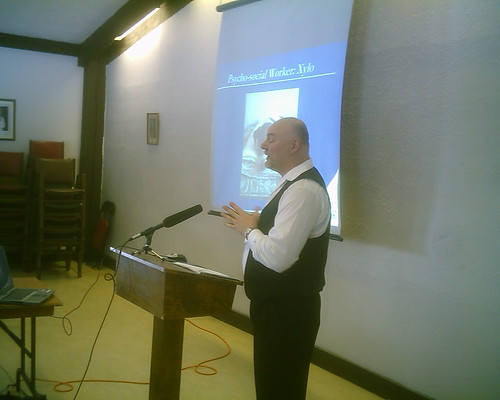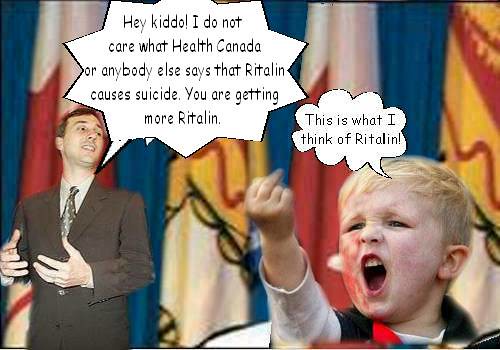I must confess that I never watch this idiot kid show but I should force myself to watch tonight.
As I told the Mayor this afternoon? I'm not allowed to call in!
Rogers will be screening the calls very closely! It should be interesting!!!
MAYOR’S WEEK ON CROSBY LIVE
Grab your telephone and talk to your mayor!
Moncton, Fredericton and Saint John mayors will be this week’s special guests on Crosby Live.
Call in and speak with your local mayor about community issues that matter to you.
Tuesday, March 14, 2006
NORM MACFARLANE WILL BE THE GUEST ON CROSBY LIVE TONIGHT AT 8:00PM!!!!
BUT MR.SPEAKER?? THE DRUGGING AND THE KILLINGD OF OUR CHILDREN WILL CONTINUE IN NEW BRUNSWICK!!!
Boy? They're really taking the issue of Ritalin to Washington D.C. but here in New Brunswick? The drugging of our young children will continue!!!
Read this one-
March 14, 2006
ADHD Experts Head To Washington - Is the FDA Up To The Task?
by Evelyn Pringle
http://www.opednews.com
Heavy-hitters from across the country are heading to Washington this month to debate representatives of the pharmaceutical industry during FDA hearings on the controversy surrounding the over-prescribing of attention deficit drugs to children.
The International Center for the Study of Psychiatry and Psychology (ICSPP) will be represented by five of the leading experts on attention deficit disorders at the FDA's Pediatric Advisory Committee's meeting on March 22, to include Dr Fred Baughman, Dr Peter Breggin, Dr S DuBose Ravenel, Dr Grace Jackson, MD, and Dr David Stein. These experts combined have authored hundreds of books, papers and reports on attention deficit disorders.*
And all five have one common goal; to put an end to the drugging for profit of the nation's most vulnerable citizens and pharma's most lucrative customer base - innocent children.
Dr Baughman says drugging kids is commonplace today. "Its happening all across country not by thousands but tens of thousands, picking most on the disenfranchized, powerless," he warns.
"These children become for-profit receptacles for psychiatric drugs," he says, "which will, undoubtedly alter their bodies and brains."
The harm caused by these medications is well-documented. Although the FDA staff reports shows 51 deaths between 1999-2003 in persons using ADHD drugs, according to Dr Baughman, the MedWatch database contains 186 deaths between 1990 and 2000. Because only 1% to 10% of all adverse events are reported to the FDA, the actual number of deaths is known to be much higher.
Studies have determined that ADHD drugs endanger the cardiovascular system and according to Dr Jackson, "the cardiovascular risks of stimulants are hardly new."
"As early as 1977," she says, "Drs. Vernon Fischer and Hendrick Barner documented the cell changes associated with heart muscle enlargement in a chronic consumer of Ritalin."
"The connection between stimulants, cardiovascular disability, and death has long been documented in the medical literature," Dr Jackson notes, "but physicians and government regulators have refused to acknowledge the hazards associated with prescriptions."
Dr Jackson takes exception with FDA officials who say warnings on ADHD drugs are unnecessary and that their benefits outweigh their risks.
"Whether by ignorance or design," Dr Jackson states, "the regulators remain oblivious to the evidence-based limitations of the prescription pad: at least 40% of all children fail to tolerate or respond to stimulant therapy; about twice as many respond at least as well to non-pharmacological interventions; and, as documented in the National Institute of Mental Health’s most prestigious study to date (the MTA study), the long term outcomes for medicated children demonstrate diminishing returns over time, persistent suppression of growth (about 1 cm per year), and artificial behavioral improvements which dissipate when treatment is withdrawn."
"Not surprisingly," she says, "the world community observes the United States with alarm for the unjustified chemical exploitation of those who are different, but not diseased."
Dr David Stein also rejects the pill solution, and promotes a parent training program called the caregivers’ skills program that helps children learn appropriate behavioral and cognitive skills permanently, without drugs. For over twenty-five years, he has conducted workshops providing realistic, practical and effective alternatives to stimulant medications.
Dr DuBose Ravenel agrees with Dr Stein's overall assessment that "this behavioral syndrome likely represents basically a culturally derived phenomenon rather than a biological or neurological one."
He stresses the importance of providing positive reinforcement for appropriate behavior while dealing with oppositional behavior and encourages fellow professionals to employ Dr Stein's approach when dealing with children with attention deficit problems.
ADHD drugs are known to have serious adverse psychological effects on children which is one of the main reasons Dr Breggin is dead against giving stimulants to kids. "That we are doing this," he says, "I believe, is ethically and scientifically wrong."
"We're the only country in the world, along with Canada, that is doing this to such massive numbers of our children," Dr Breggin notes. "It's a reflection not on our children, but on ourselves as parents and as teachers."
Dr Breggin describes an all too common occurrence in recent years. "As the child's emotional control breaks down due to medication effects, mood stabilizers may be added," he explains. "Eventually, these children end up on four or five psychiatric drugs at once and a diagnosis of bipolar disorder by the age of eight or ten," he says.
In addition, there is now a mountain of evidence that stimulants disrupt growth hormone production on a daily basis and that they also can reduce the child's overall growth, including height and weight, according to Dr Breggin.
"All stimulants impair growth," he notes, "not only by suppressing appetite but also by disrupting growth hormone production."
"This poses a threat to every organ of the body, including the brain, during the child's growth," Dr Breggin warns. "The disruption of neurotransmitter systems adds to this threat."
"It is hard to imagine a more serious warning flag than growth inhibition," he says, "since it affects the overall growth of the body and all its organs, including the brain."
Its a well documented fact that the pharmaceutical industry funnels money to front groups, which in turn fund marketing campaigns and come out to do battle at times like this when drug company profits are threatened and scrutinized.
On February 15, 2006, Children and Adults with Attention-Deficit/Hyperactivity Disorder (CHADD), the leading Pharma backed front group responsible for pushing ADHD drugs issued a press release criticizing the FDA Advisory Committee's recommendation last month to add black box warnings to the labels of stimulant drugs.
In the press release, E Clarke Ross, identified as CEO of CHADD stated: "The committee's recommendation to include warning language about rare and unproven cardiac health risks on medications used to treat ADHD is premature, at best, and could unnecessarily alarm patients and clinicians."
"The committee," the press release continued, "directed by the FDA to decide how to move ahead with additional research on the medication's safety, endorsed future studies, trials and surveys for both pediatric and adult patients, and then approved the unsolicited recommendation to include warning language on patient inserts and labels."
Clarke said the committee "approved the unsolicited recommendation to include warning language on patient inserts and labels."
On March 13, 2006, the Shreveport Times published an article by Terry Davis, that seems to directly address the issue raised by CHADD, which began with the question: “Do drugs used to treat attention deficit hyperactivity disorder need a black box warning because of reports that they may cause sudden death?”
Ms Davis was a member of the FDA advisory committee that decided last month that they did. In the article she explains the reasoning behind the decision.
“The panel felt the parents of the 2.5 million children taking medication such as Ritalin or Adderall -- the 1.5 million adults also on these medicines, as well as their physicians -- need to be alerted about the drugs' significant risks,” she wrote.
“The advisory panel was also concerned that ADHD drugs are overused,” she said and noted that more than "30 million prescriptions -- valued at $3.1 billion -- are filled annually."
“ADHD medications help,” Ms Davis acknowledged, “however, they are also known to increase blood pressure and heart rate and may increase risk of stroke and arrhythmia in adults,” she said.
She pointed out that last year, “25 people, mostly children, died suddenly after taking these prescribed drugs.”
In light of this logical explanation, CHADD's criticism of the panel's recommendation is obviously unwarranted but hardly surprising.
The group bills itself as the nation's largest patient education group for persons affected by ADHD, and says it provides consumer, patient, and professional information. But those familiar with the marketing tactics of ADHD drugs know all about CHADD's long history of concerted effort to increase drug company profits through the sales of stimulants.
According to Dr Baughman, as far back as 1995, the DEA was contacted by the United Nations International Narcotics Control Board (INCB), about the financial ties between CHADD and Ciba-Geigy, the manufacturer of Ritalin at the time.
The INCB discovered CHADD had received over $775,000 from Ciba-Geigy and charged the organization with being a vehicle for marketing a controlled substance to the public in violation of the international statute known as the Controlled Substances Act of 1971.
Ritalin is classified as a Schedule II medication. In order for a product to be classified as a Schedule II drug under the Federal Controlled Substances Act, it must meet three criteria: one, it has to have a high potential for abuse; two, it has to have a currently accepted medical use in treatment in the US; and three, it has to show that abuse may lead to severe psychological or physical dependence.
It seems CHADD was lobbying the Drug Enforcement Agency to get Ritalin removed from the Schedule II class and moved into a less controlled group to make the drug easier to buy.
"They couldn't do anything more valuable for the drug company, and more dangerous to the public," according to Dr Baughman.
However, it's lobbying failed, in part because of the disclosure about CHADD receiving so much money from the drug companies, according to Dr Breggin.
After conducting its own research, the DEA not only refused to reclassify the drug, on May 16, 2000, the agency issued a report to Congress that said Ritalin use had reached epidemic proportions, and that it was being abused as a recreational drug.
DEA told Congress that police were reporting that Ritalin was being stolen, sold and traded on playgrounds, as well as snorted, injected, and cut much like any other amphetamine. Although the DEA presented a thorough report, nothing was done to slow the sale of Ritalin to children.
And nothing changed as far as CHADD‘s employment status as a major pusher for Pharma either. For the fiscal year 2002-2003, the group’s financial statements showed it received more than $670,000 from various drug companies.
In the November 29, 2004 Alternet article “Drug Companies Pushing ADHD Drugs for Children,” reporter Kelly Hearn further discussed the ties between CHADD and the drug companies in an interview with Dr William Pelham, director of the Center for Children and Families at State University of New York at Buffalo, a leading ADHD researcher for 30 years, and a former advisory board member of McNeil Pharmaceuticals, which markets the ADHD drug Concerta.
Over his career, Dr Pelham has written over 250 research papers on ADHD, and in 2002, he even received a lifetime achievement award from CHADD.
However, he has few good words to say about CHADD, regulatory officials, medical professionals, or anybody else involved in selling ADHD drugs to children.
"In recent years," Dr Pelham told Alternet, "I have come to believe that the individuals who advocate most strongly in favor of medication - both those from the professional community, including the National Institutes of Mental Health, and those from advocacy groups, including CHADD - have major and undisclosed conflicts of interest with the pharmaceutical companies that deal with ADHD products."
"I believe that parents of ADHD children and the public at large should be made aware of this situation," he told Ms Hearn.
According to Dr Breggin, front groups like CHADD use pharma money in several marketing techniques that increase the sale of drugs. "They put out newsletters and other information that praise medications," he says.
"Sometimes," he notes, "they actively suppress viewpoints that are critical of drugs—for example, by discouraging the media from airing opposing viewpoints."
Representatives of CHADD showed up at the FDA hearings last month and the group will no doubt be out in full force this month ready to go head to head against pharma's number one enemy - the advocacy groups opposed to the mass drugging of children for profit.
By Evelyn Pringle
evelyn.pringle@sbcglobal.net
BERNARD LORD JUST RECEIVED A HUGE SLAP IN THE FACE!!!!
Lord's party bonus a slap in the face
What a slap in the face to read, on the front page of the Telegraph-Journal on March 2, two headlines - "Property tax bill up again this year" and "Lord's PC salary up sevenfold since '99". Really, doesn't the Lord government know that most poor and middle class can hardly pay their rent or mortgage and keep food on their tables for themselves and their families? Many New Brunswickers would gladly work a little "extra time" just to have the necessities of life. Maybe the Lord government knows that a change is coming so they should work "extra hours for the extra pay" while they can. Not so easy for New Brunswickers who have lost their jobs and not much hope of getting another one. Does anyone know why the property taxes went up? My grandchildren all with university degrees except one had to leave New Brunswick to find decent paying jobs.
BARBARA McLEAN
Blacks Harbour
NORM MACFARLANE WORDS - CHARLES I HAVE A NICE TAN BECAUSE THE SUN ALWAYS SHINES ON SAINT JOHN!!!

I bumped into the Mayor this afternoon and I asked his assistant Andrew < what's his last name? > I asked him to take a picture but he couldn't do that one right?
I seem to have trouble getting my picture with the Mayor as this one in Fredericton before Christmas.

Yes, those were the words from Norm MacFarlanc - He has a tan because the sun always shines in Saint John! ..lol..

CHARLES ONCE AGAIN COMES FACE TO FACE WITH 555!!!!

For you newcomers? You can read a past blog I wrote about 555 in August. You can read it by clicking here -
target="_blank">Charles
Blog
555 is still doing the same life. She turned to prostitution to feed her habit. It’s sad because I always like 555!
While chatting with her, she noticed the Saint John Police Forces going at Tim’s.

It would be great if the Saint John Police Force announced a huge news conference telling the rest of the country that we need a lot of money from the Provincial and Federal Government for Methadone clinics.
There is no need to have a huge waiting list in New Brunswick for Methadone. People are dying while waiting and this is not right!!! Do people care? Of course not!!!
555 has been on a waiting list for months and months.
Last month a guy name Phil Gauthier.


He came from Vancouver as a guest speaker in Fredericton.

He told the audience that there’s a methadone clinic on every block but here it’s a total different story.
Afterwards, I was chatting with this high profile drug councillor about the numbers of people who's on Methadone.

I feel very bad for 555!

She told me that if she was on Methadone? She would be off the streets!
While chatting with her? She said - Oh dear? There’s goes my drug dealer and I got no money!
You would believe these drug dealers would have a little sympathy once in a while but it doesn’t work this way!
All they do is drive around the City and sell the drugs Pretty good life if you asks moi?
The needles are over the streets in Saint John but our elected official don’t give a darn.

Can you imagine the crime spree that’s going on within the family unit that’s not reported to the Police?
Almost every household has been broken into but the Government don’t care.
Andy Campbell from ATV News did a story last week of the problem with shoplifting in Fredericton because of the problem with Dilaudid.


555 wouldn’t wish to end up as Chrissy < I believe that’s her name?

This young girl died last year and I was told that her heart was 80% block by the oxy-contin. I guess her name was Chrissy!

Her friends put a picture on the corner where she used to work as a prostitute to feed her habit. She’s dead now but maybe her memory will stay around for a bite.
So? What’s going to happen to 555? Is she going to make it? Will she die on the waiting list for Methadone?

In Nova Scotia if someone dies from oxy-contin? The whole province knows but not here in New Brunswick.
They just label it as heart failure. Very sad indeed.
It doesn’t matter what 555 does? She’ll always be a friend of mine.
The old saying is so true You know who your friends are when you’re down?

These days 555 is really down there and I pray that one day she’ll get her much needed methadone.

GOD'S MINUTE!!!
PUT ON THE WHOLE ARMOR OF GOD, THAT YOU MAY BE
ABLE TO STAND AGAINST THE WILES OF THE DEVIL.
( EPHESIANS 6:11 *NKJV )
Dear Charles,
God tells us to put on the Gospel Armor to protect us from
satan's evil tricks and temptations as well. This is; BECAUSE
YOUR ADVERSARY THE DEVIL WALKS ABOUT LIKE A
ROARING LION, SEEKING WHOM HE MAY DEVOUR.
( 1 PETER 5:8 )
Therefore God also tells us what the Gospel Armor is, for
He said; STAND THEREFORE, HAVING GIRDED YOUR
WAIST WITH TRUTH, HAVING PUT ON THE BREASTPLATE
OF RIGHTEOUSNESS AND HAVING SHOD YOUR FEET
WITH THE PREPARATION OF THE GOSPEL OF PEACE;
ABOVE ALL, TAKING THE SHIELD OF FAITH WITH WHICH
YOU WILL BE ABLE TO QUENCH ALL THE FIERY DARTS
OF THE WICKED ONE. AND TAKE THE HELMET OF
SALVATION, AND THE SWORD OF THE SPIRIT, WHICH IS
THE WORD OF GOD. ( EPHESIANS 6:14-17 )
Now that you know what the "Gospel Armor" is, wear it with
pride. It is perfect for every occasion from a black tie affair, to
mowing the lawn! Best of all it never goes out of style and
one size fits all! So Charles, think of it like the American
Express Card, "Don't leave home without it!" For wearing that
armor will help you to; RESIST THE DEVIL AND HE WILL FLEE
FROM YOU. Amen! ( JAMES 4:7 )
With My Love & Prayers,
your servant Allen
[ Prayer Requests---Contact Us---Bible Study---*Donations* ]
[ Audio---Subscribe---Change of Address---Unsubscribe ]
at: http://www.godsminute.org
Apostle Paul Ministries, P O Box 55996, Hayward, CA 94545
(c) Copyright 2006 by Apostle Paul Ministries
BERNARD LORD - HEY KID???? DO YOU WANT TO PLAY SOME VIDEO GAMES???
ADHD patients play video games as part of treatment
By Susan Jenks , Florida Today
A generation raised on video games is inspiring researchers' efforts to unlock the mysteries of a puzzling learning disorder that afflicts millions of school-age children and even some adults.
Whether speeding down a virtual street in Sony's Gran Turismo or slaying Spyro the Dragon, researchers hope games such as these will improve the lives of those with attention-deficit hyperactivity disorder, commonly known as ADHD, or cognitive-processing difficulties.
People with these disorders experience "constant frustration," says Henry Owens, a Melbourne, Fla., clinical psychologist who recently began offering a patented video game system, which evolved from NASA technology, to some of his patients.
"If they just play video games on their own, they will zone out," he says. "When they play on this system, if they zone out, the video game doesn't respond any more," acting as an incentive to improve focus and concentration.
That comes through controlling brain-wave activity, which some researchers say is too slow or too fast in certain areas of the brain when patients have ADHD.
Video game play is a form of neuro-feedback, Owens says, which teaches patients to self-regulate brain-wave patterns to improve learning.
But some researchers remain cautious.
"It's still controversial," says Dr. Andrew Adesman, chief of developmental and behavioral pediatrics at Schneider Children's Hospital in New Hyde Park, N.Y.
He says studies have yet to show video game play with a neuro-feedback component has either a short-term or long-term benefit, despite parents' desire to explore other options in the wake of recent concerns about Ritalin and other stimulants used to treat ADHD.
They need to ask, "Does it help, and is it the best treatment available?" says Adesman, a spokesman for Children and Adults with Attention-Deficit/Hyperactivity Disorder, a non-profit education, advocacy and support group in Maryland.
The concern, he adds, is parents might abandon mainstay treatments — a combination of pharmacological and educational interventions that have been tested and proved over time.
Owens, however, says some patients have been using the video game system, developed by the San Diego company CyberLearning Technology, in combination with medications, while others want to try the non-drug alternative first, before turning to drug therapy.
Owens says he has four patients playing Smart Brain Games (www.smartbraingames.com), as the system is known, at home — a recent alternative to in-office sessions, which began about a year ago.
Of the home training, he says, "Its advantage is intensity," although he advises against playing more than 20 minutes a day for children younger than 10, and no more than a half-hour daily for everyone else.
And while the company makes the system available directly to consumers — and it is compatible with any Sony off-the-shelf video game — Owens says that without an initial evaluation with an electroencephalogram or EEG, to map brain activity, "how would you know what's being treated?"
"Because this is so new and such a commitment," he says, "we don't want parents to do it lightly."
FDA approved
In Florida, Owens is one of only five practitioners authorized by the company to offer its gaming system.
Lindsay Greco, a co-founder of CyberLearning, says the company has 54 providers Nationwide, identified by "licensure and their expertise in neuro-feedback."
She says the system has approval from the U.S. Food and Drug Administration, and that by mid-2003 the company had acquired an exclusive license from NASA to take Langley Research Center's technology, enabling researchers to measure the brain waves of pilots during flight simulations, into the gaming arena.
The device works through a specially designed helmet, with built-in sensors that monitor a player's brain waves. Signals from the sensors are fed through a signal-processing unit and then to a video controller as a game is played.
"There are other systems with computer-based technologies where the bar goes up and down," Greco says. "But these are rudimentary. Our games empower you to change your own brain's physiology."
Like Owens, she says the best games are jumping and racing games that provide consistent movement and a better ability to measure feedback response.
Also, where there is a diagnosis of ADHD, she says, patients should seek providers' expertise on how best to use the system.
Of the roughly 700 systems sold, she says, about 70% have gone to patients using them under the supervision of a health care professional, while 30% have been bought by people for entertainment or those "simply wanting to sharpen their attention or memory."
Greco says in-office neuro-feedback programs normally cost from $4,000 to $5,000, while their system costs $584, with in-office network provider supervision running less than $2,000.
Insurance typically does not cover any of these expenses.
"Cost has been a huge challenge for many consumers," she says.
'Quite helpful'
Although he has not worked with the video game system, Thomas Peake, another Melbourne clinical psychologist, supports the concept "in the right hands."
"If it's done right, these things, in and of themselves, can be quite helpful," Peake says. "And kids are used to playing games and like them."
He says he used to do biofeedback to help patients control pain and has seen it used in major medical centers to help speed recovery in stroke patients.
"Most people off the street would not know how to use these devices, however," he cautions. "But, to me, the principle is a good one."
SAINT JOHN'S HERO MAKES A STOP TO CHAT WITH THE LNG PROTESTERS!!!!
Once again? I had to pretend that I was a hitman from the Irvings!!!!
















